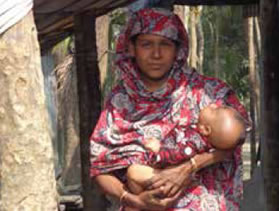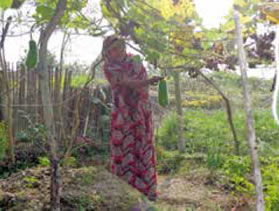The story of a woman farmer in rural Bangladesh

Rajopa is a housewife living with her husband, a day laborer, and their four children in the Charkhalifa village of Barisal Division in the southern delta region of Bangladesh. Like the majority of women in her wealth quintile, Rajopa is illiterate.1
For years, Rajopa and her husband have struggled to feed their family on a marginal income. “My husband is the only earning member of the family, and his income is very low,” Rajopa said. “...He cannot manage his family with this low income. So we could not provide enough food to our children.” The youngest child, eight months old, is underweight and often suffered from diarrhea. Rajopa did not know the universal recommendation that children should be fed complementary foods, in addition to breast milk, from six months to two years, so she continued to exclusively breastfeed. The infant did not receive enough calories and nutrients needed for proper growth.
Rajopa applied the hands-on education she received to plant and harvest seasonal fruits and vegetables on her family’s previously uncultivated land.
With funding from the U.S. Agency for International Development (USAID), the Strengthening Partnerships, Results and Innovations in Nutrition Globally Project (SPRING) invited Rajopa to join a Farmer Field School (FFS), a community-level program that provides training on homestead food production. It targets resource-poor households with pregnant and lactating women and children under age two and employs a group-based, supportive learning process to enhance their access to diversified, nutrient-rich vegetables, fish, and poultry (see box).
Nutrition and Hygiene from the Ground Up
SPRING/Bangladesh began FFS implementation in 15 upazilas (subdistrict-level administrative regions) in June 2012. It currently works in 40 upazilas across USAID’s Feed the Future intervention divisions of Khulna and Barisal. A typical FFS has between 15 and 20 participants, each representing a targeted household. Since June 2012, SPRING has established 1,301 FFS groups, reaching 29,217 pregnant and lactating women in the lowest two socioeconomic quintiles in the 40 target upazilas.
In subsequent years, SPRING plans to maintain its current geographic area while increasing its proportionate coverage of pregnant and lactating women in the lower two socioeconomic quintiles by doubling its target reach of FFS households in these quintiles from 17 to 60%. A target of 48,000 households will participate in 2,560 FFS programs in Khulna and Barisal.

As part of her FFS sessions, Rajopa also received counseling on a package of Essential Nutrition and Hygiene Actions (ENHA). These are small, cost-effective, and easily “doable” actions focused on dietary diversity, women’s nutrition, and hygiene that have been proven to prevent disease transmission and reduce maternal and child undernutrition, mortality, and morbidity. Along with this training, Rajopa was taught how to build and install a household “tippy tap” (a simple handwashing device) near toilets and kitchens to improve the adoption of hygienic handwashing practices. Rajopa applied the hands-on education she received to plant and harvest seasonal fruits and vegetables on her family’s previously uncultivated land. She also became involved in rearing poultry.
“When I joined the FFS, I had no idea what it was about and what my benefit would be to be a member,” Rajopa said. “I thought it would be a waste of time, but a few days later, I realized that it could change my fate. I never thought that I could benefit from homestead land that [I thought] was useless.”
Rajopa’s children think the tippy tap she installed is exciting and fun to use. The produce generated from the garden fulfills a large proportion of the family’s daily food requirements and has helped to change their food intake pattern. She is now able to meet a substantial portion of the family’s nutritional needs with this produce from her garden. She also provides a daily egg to her youngest child who is now healthier and less frequently sick. “My husband also helps me in my [homestead food production] work and is very happy to see my development.”
While she has “graduated” from the FFS, Rajopa says her success has inspired those around her, encouraging other community members to seek knowledge from her. Rajopa is happy to share the guidance she has received on homestead food production and how to use ENHA to maintain her family’s health.
1 National Institute of Population Research and Training (NIPORT), Mitra and Associates, and ICF International. 2013. Bangladesh Demographic and Health Survey 2011. Dhaka, Bangladesh and Calverton, Maryland, USA: NIPORT, Mitra and Associates, and ICF International.